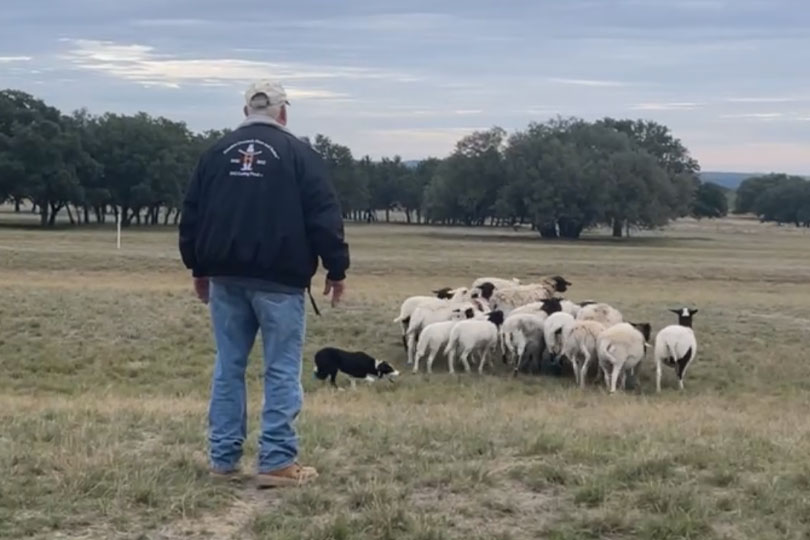By Shelby Shank
Field Editor
Students across the state saw a working farm dog in action through Texas Farm Bureau’s (TFB) Farm From School program.
Kindergarten through fifth-grade students virtually “meet” with a farmer or rancher once a month through the program using a video conferencing app.
This session, students learned from Russell McCord and his border collie, Sally, about the work farm and ranch dogs can do.
“Each month, we bring agriculture to the classroom through these virtual visits to give students a look at the diversity of agriculture. They get to learn about the various crops grown in Texas, the livestock that ranchers raise and so much more about agriculture like the role that dogs play on the farm,” said Jordan Bartels, TFB associate director of Organization Division, Education Outreach. “Students asked Russell many questions about Sally and the commands she knows.”
McCord has owned and trained border collies since the mid-eighties. He has had Sally since she was a six-week-old puppy and started training her when she was eight months old. Now, Sally is 4 years old, knows how to round up sheep for McCord and has won a quite a few titles.
“She’s a wonderful dog. She won Dog of the Year for the Texas Sheep Dog Association and has qualified for the finals the past three years,” McCord said. “She also qualified for the world trials, which is a huge honor, and she was one of 10 dogs from the United States that qualified. We’re proud of her.”
McCord taught Sally 15 commands that he uses when working and moving sheep.
McCord uses a shepherd’s whistle to teach Sally her commands. Dogs can hear the whistle from a great distance, which is beneficial when they are bringing up livestock far away and can still hear the command.
“The cool thing about border collies is they’re really smart dogs, and you can teach them just about anything,” McCord said. “Her natural instinct is to go around the sheep and bring them to us. After working with them for a while and they know their commands, you can teach dogs to move the sheep away from you. That can be hard because it goes against their natural instincts.”
It can take up to a year to fully train a working farm dog.
When looking for his fur-ever friend, McCord pays attention to their build, feet size and tongue.
“Dogs sweat through their mouth,” he said. “If their tongue sticks out in front of them and they pant a little, they generally have a lot of stamina. If their tongue hangs out to the side and they’re panting really bad, that dog usually does not have much stamina.”
McCord looks for a dog with a lot of stamina because farm and ranch dogs need to be able to work for periods of time without getting too hot.
Sally doesn’t always work alone. Sometimes, working dogs run in pairs to move larger herds of livestock.
McCord also keeps guardian dogs on his ranch to protect his sheep from predators like coyotes. They work throughout the day and night to ensure his livestock are safe.
When Sally’s work is done and the sheep are rounded up, McCord always makes sure to give his dog a few extra pets.
“I think when a dog knows you love and appreciate them, they know they did a good job working,” he said. “They’re not just out working dogs, but our very best friends.”
More information
The last session for the fall semester will focus on citrus.
Next year, students will learn about farm equipment, strawberries and more during the spring Farm From School program.
Teachers can register online. Click here to sign up by Jan. 11.
Visit texasfarmbureau.org/aitc for more information and the latest announcements on TFB’s Ag in the Classroom activities.

